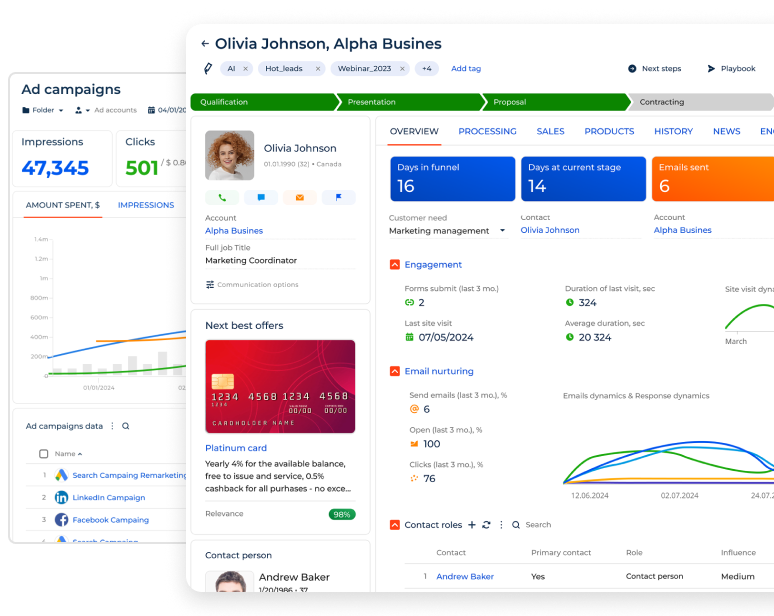-
No-Code
Platform
-
Studio
No-code agentic platform delivering the fastest time-to-value and the highest ROI
-
Studio
-
AI-Native CRM
CRM
-
AI-Native CRM
New era CRM to manage customer & operational workflows
CRM Products -
AI-Native CRM
- Industries
- Customers
- Partners
- About
Government CRM Guide: Best CRM’s, Features, and Benefits
Updated on
November 14, 2025
10 min read
Creatio: Agentic CRM to Enhance Gov Services

Citizens put a lot of trust in government agencies’ ability to efficiently serve the community. However, managing citizen needs, services, and complex workflows while ensuring transparency and accountability, can be challenging. Especially for national and state agencies that have to serve large populations and handle a wide range of public services.
The coordination between departments, compliance with regulations, and timely responses to citizen requests only increase the complexity of daily operations. How can public sector organizations overcome these challenges and improve their services? By investing in a CRM (Customer Relationship Management) system tailored to the needs of the public sector.
Government CRM software helps streamline processes, improve citizen communication, and boost operational efficiency. In this article, we discuss how the right CRM solution can transform the way government agencies work and how to choose the best solution.
Key Takeaways
- Government CRMs are centralized platforms that help government organizations manage citizen relationships, offer digital services, streamline workflows, and enhance transparency across federal, state, and local government levels.
- CRM systems for government bodies offer multiple benefits, including enhanced communication and citizen engagement, streamlined case management, increased transparency and trust, data-driven decision-making, and improved interdepartmental collaboration.
- Key features include service management, workflow automation, self-service online portals, regulatory compliance control, and Artificial Intelligence (AI).
- The best government CRM solutions, such as Creatio, Salesforce Government Cloud, Dynamics 365 US Government, Oracle Government CRM, and Knack, balance security, compliance, and usability to meet the complex needs of modern governance.
What is Government CRM?
Government CRM is a system designed to help government service agencies manage interactions with citizens, businesses, and other entities. It centralizes information, streamlines communication, and ensures government agencies can provide more efficient public service.
Government CRMs centralize data from multiple departments and service channels, such as contact centers, websites, and in-person offices, into a single, unified system. With a dedicated CRM, government institutions can easily track and manage constituent inquiries, requests, and complaints, gaining a 360-degree view of each constituent. Because of the nature of government processes, CRM focuses on compliance with national and international laws, security, and managing complex workflows specific to public sector needs.
Find out more about a CRM for government contractors.
Benefits of Using a CRM in the Government Sector
Implementing a government CRM system revolutionizes the way public institutions interact with citizens, manage operations, and deliver services. By centralizing data and automating processes, these systems enable governments to operate more efficiently, while enhancing citizen satisfaction.
Below are the most significant benefits of adopting a CRM designed specifically for the public sector:
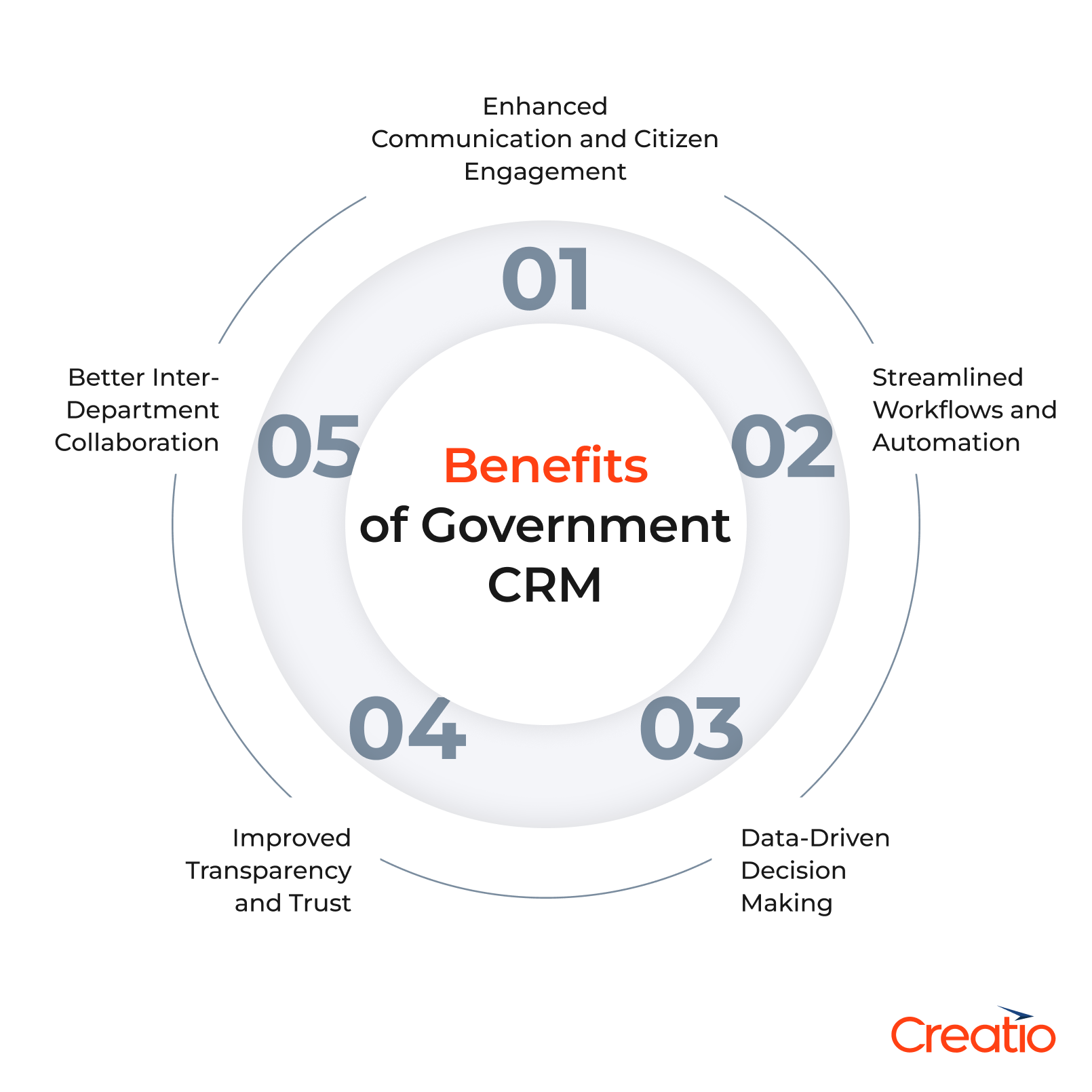
Streamlined workflows and automation
By automating repetitive tasks, such as data entry, document filing, case routing, and status notifications, a government CRM system significantly reduces manual workload. Routine operations like permit processing, service request tracking, and appointment scheduling can run automatically, allowing employees to focus on policy development, strategic planning, and community engagement.
Creatio Implementation
Find out how the City of Boston can handle 1000 cases daily using Creatio’s AI-powered no-code platform.

Enhanced communication and citizen engagement
A government CRM enhances communication and citizen engagement by making interactions faster, more personal, and transparent. With centralized data and complete citizen profiles, agencies can deliver timely, relevant responses, improving citizen satisfaction.
Integrated omnichannel communication tools, including email, chat, and phone, ensure that citizens can connect with government services through their preferred channels. Constituents no longer have to visit their local offices but can simply submit requests, ask questions, or receive updates online or via phone. This convenience not only saves time for both citizens and staff but also broadens access to essential services, leading to stronger engagement and a more positive citizen experience.
Better inter-department collaboration
CRM for government helps public servants from different departments work more closely. They have access to a unified platform with necessary information and communication tools that allow them to collaborate easily. Thanks to automatic task routing and notifications provided by the CRM, employees can pick up tasks as soon as it's their turn to work on them, without additional communication or follow-ups. With access to shared data and communication tools, departments can collaborate more effectively, improving service delivery.

Our legacy system was brittle. With Creatio, we’ve gained control and flexibility to build and support solutions internally, helping our departments deliver services more efficiently to the people of Boston.
Data-driven decision making.
Government CRMs consolidate data from multiple systems and communication channels into unified dashboards. Leaders can analyze performance indicators, identify service gaps, and make informed policy decisions based on real-time insights. Predictive analytics can also help anticipate demand, optimize resource allocation, and improve long-term planning.
Improved transparency and trust
By tracking interactions and case histories, CRMs provide a clear audit trail for all citizen engagements. Public administrators can easily report on service delivery metrics and demonstrate compliance with standards and government regulations. This transparency helps build public trust and reinforces accountability across government operations.
5 Best Government CRM Software
Choosing the right CRM is crucial for modern public service delivery, whether at the federal, state, or local government level. The best government CRM software enables agencies to manage citizen interactions, streamline internal processes, and ensure transparency while upholding strict security and compliance standards.
Below are five top solutions designed specifically to meet the unique needs of government organizations.
Creatio
Best suited for: Government agencies seeking a secure, flexible, no-code CRM with built-in AI to streamline government operations and services.
Creatio is an agentic CRM and workflow platform with no-code and AI at its core, tailored to help government agencies streamline operations and enhance citizen services. The platform includes pre-built workflows and templates for common government processes, such as permitting, case management, and citizen request handling, allowing agencies to launch quickly and operate efficiently.
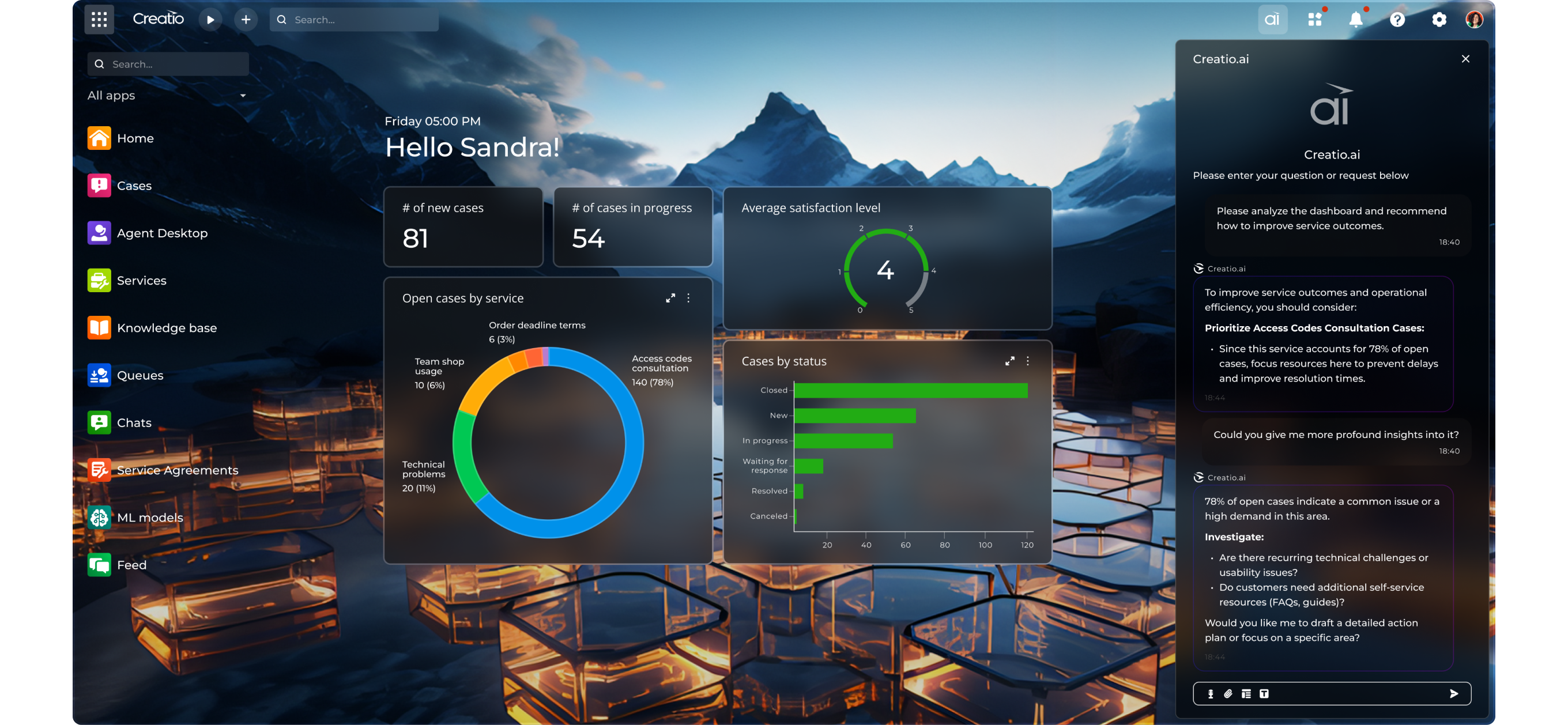
At the same time, Creatio offers extensive customization capabilities, allowing teams to adapt or build new workflows without requiring coding or heavy IT involvement. With its composable architecture, user-friendly interface, and AI capabilities, Creatio ensures every agency can configure the system to match its unique operational and regulatory needs while ensuring data security.
Powered by Creatio.ai, the platform leverages intelligent process optimization and AI agents to automate routine tasks, analyze performance, and provide recommendations for workflow improvements. Creatio AI agents act as digital coworkers, executing tasks, routing requests, generating reports, and assisting employees with data-driven insights. By leveraging real-time analytics and contextual understanding, they enhance productivity, reduce administrative burden, and enable agencies to operate more efficiently.
Security and compliance are top priorities for government agencies, that’s why Creatio CRM, complies with the highest data privacy standards and provides robust security features, like end-to-end data encryption and role-based access control. Additionally, Creatio’s integration capabilities make it easy to connect with third-party applications used by government agencies. With pre-built connectors and API integrations, Creatio ensures seamless data flow and communication across multiple systems.
Pros
- Prebuilt, industry-specific workflows designed for government operations.
- Extensive customization through no-code and AI-powered tools.
- Intuitive, user-friendly interface that supports wide adoption.
- Built-in AI agents included at no extra cost.
- Unified ecosystem of all Creatio products, including Sales, Marketing, and Service.
- A vast marketplace of extensions and third-party integrations that connect the platform with other government systems.
- Robust data protection, compliance, and AI governance frameworks.
Cons
- May require an initial learning period for users new to CRM systems, due to the platform’s extensive customization options and advanced capabilities.
Pricing
Pricing for Creatio CRM starts at $40 per user per month with no additional fees for Creatio AI.
Salesforce Government Cloud
Best suited for: U.S. government agencies that need a secure, compliant, and scalable platform.
Salesforce Government Cloud is a platform built specifically for U.S. agencies and contractors that meets federal standards, such as IRS 1075 and FedRAMP. It’s a secure solution that enables government agencies to manage citizen information and applications. The platform combines Salesforce’s CRM capabilities with tools tailored for public-sector operations, enabling agencies to streamline workflows, track cases, and enhance collaboration across departments.
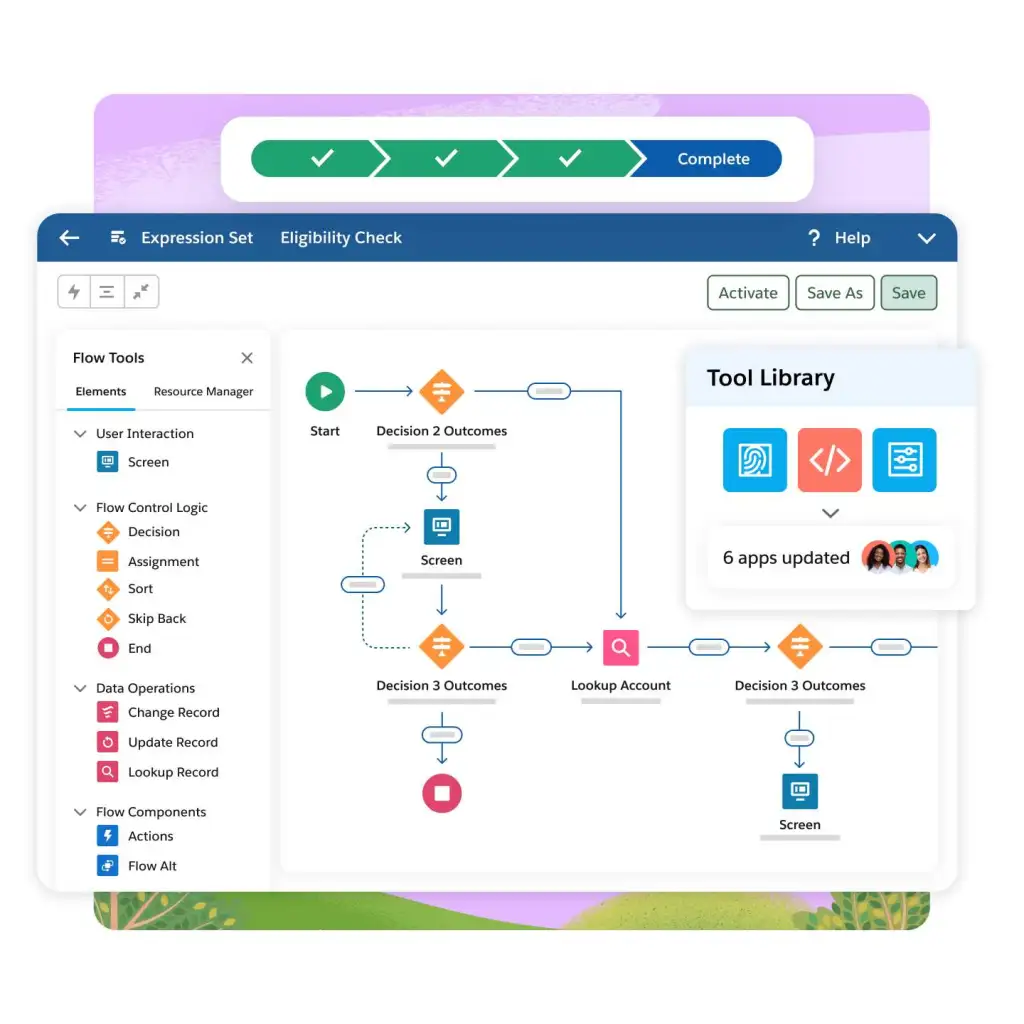
Pros
- Pre-built public-sector-specific solutions and templates.
- No-code tools enable users to quickly build processes, websites, and apps.
- AppExchange - a repository of ready-to-use apps.
- Secure cloud infrastructure.
- Secure integration across data, systems, and AI models.
- Compliance tools - designed to meet authorizations, such as FedRAMP High, IRS 1075, DoD IL4 and IL5, and Top Secret.
Cons
- Not suitable for government bodies outside of USA.
- Complex and difficult to use.
- Requires developers' help to fully customize.
- Slow when dealing with large amounts of data.
- High and unpredictable costs due to additional fees for AI capabilities and advanced features.
Pricing
Pricing for Salesforce starts at 15% applied to net spend, and it’s billed annually.
Dynamics 365 US Government
Best suited for: Government agencies in the USA that already use Microsoft tools.
Microsoft Dynamics 365 offers a tailored CRM solution for the United States public sector, including US federal, state, local, tribal, and territorial government entities. It helps modernize administrative processes, streamline workflows, and increase efficiency in government services. Microsoft makes public interactions with government agencies more accessible while protecting citizen data and ensuring regulatory compliance with federal requirements, including FedRAMP, CJIS, IRS 1075, and DISA SRG L2 requirements.
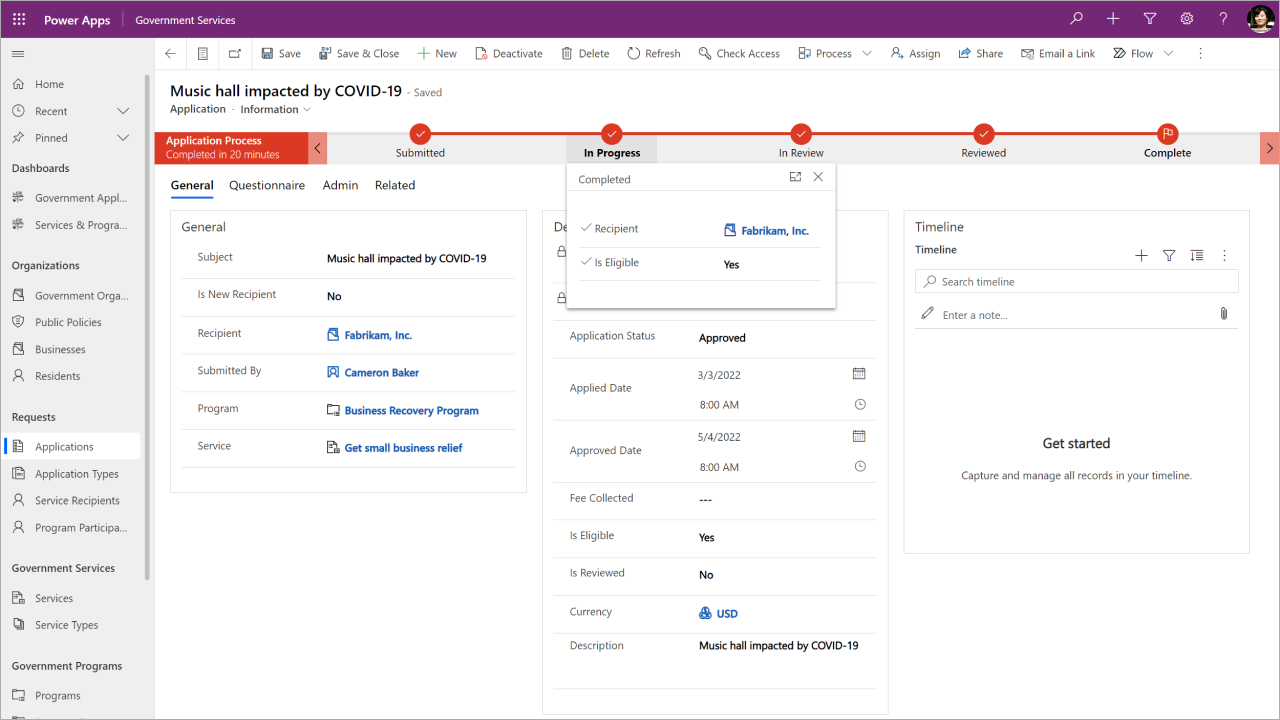
Pros
- Self-service platform that allows constituents to access information, submit requests, and check the status of their inquiries.
- Seamless integration with other Microsoft tools, such as Azure.
- Microsoft Copilot - boosts agent productivity and enhances service experiences with generative AI.
- 3-layer data security model - provides robust security features, such as role-based security, record-based security, and field-based security
Cons
- Not suitable for government agencies outside of USA.
- A steep learning curve due to complex implementation and use.
- High total cost of ownership, depending on scope, customizations, modules, and support requirements.
- Lack of natively embedded AI capabilities.
Pricing
Pricing is available upon request.
Knack
Best suited for: Small to mid-sized government agencies that need a secure platform to manage citizen services.
Knack is a CRM platform that provides no-code tools for data management and workflow automation. It enables non-technical users to create applications using templates and visual builders, eliminating the need for IT resources to customize solutions to meet their specific needs. Knack helps automate repetitive tasks, such as sending emails, updating records, and updating deadlines, while ensuring security and compliance with strict government regulations.
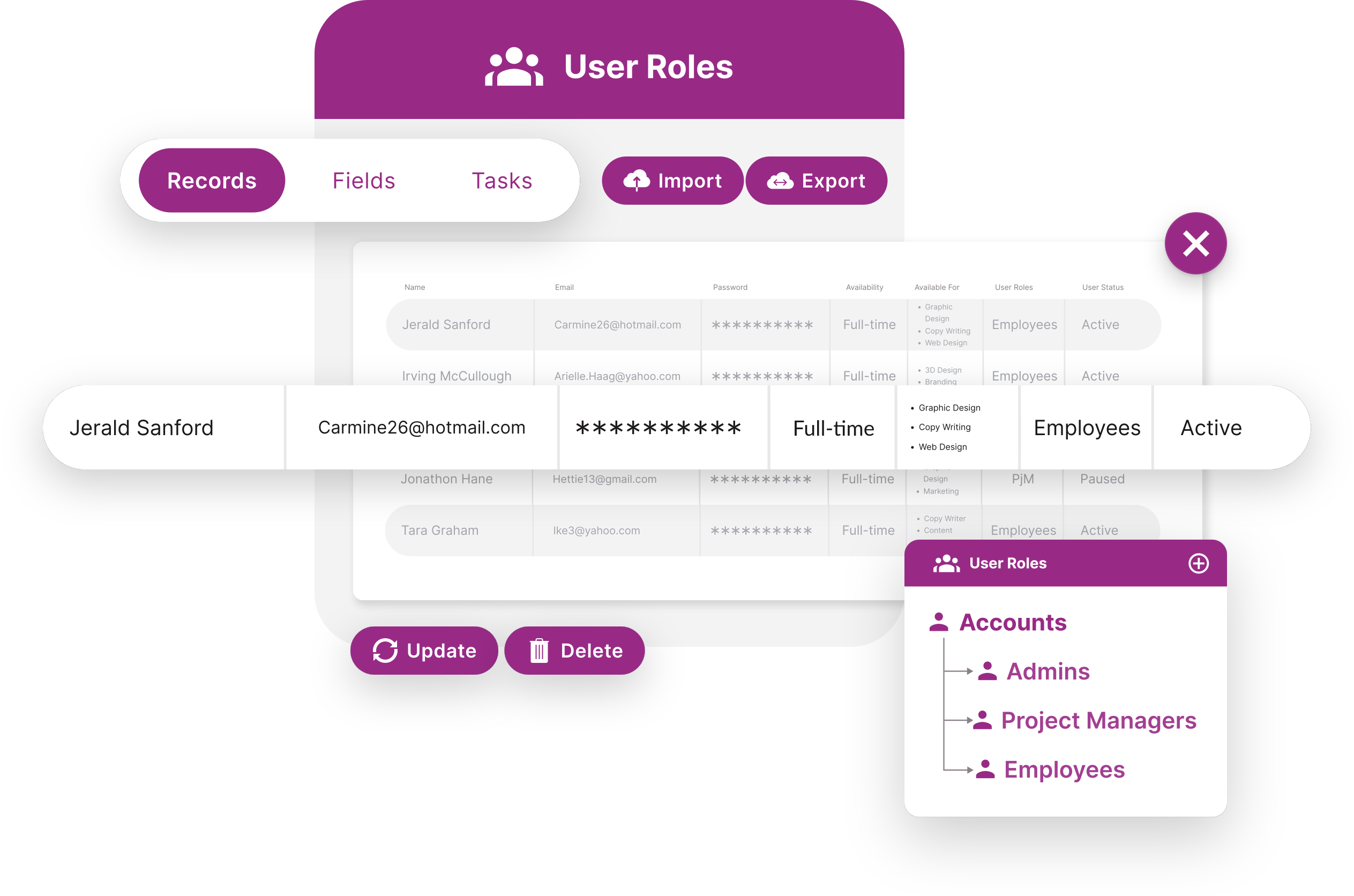
Pros
- Robust security measures - role-based access control and data encryption.
- Infrastructure services and hosting - helps manage infrastructure repairs and maintenance.
- A self-service portal for citizen services, allowing them to schedule appointments and pay fees online.
- Cost-effective for smaller/mid-sized agencies.
Cons
- Limited out-of-the-box functionality compared to full enterprise government-CRM suites.
- Less advanced integration and enterprise features.
- Issues with the interface are causing load-time/bug problems in certain scenarios.
Pricing
Pricing for the Knack government CRM is available upon request.
Oracle
Best suited for: Large public sector agencies (federal, state, multi-jurisdictional, or multi-agency programs) that require robust security, compliance, and data sovereignty.
Oracle’s government solutions enable public sector agencies to manage constituent engagement, service delivery, and agency workflows. The system is designed to provide a 360-degree view of constituents, automate case and service requests, and support self-service digital portals and interactions across multiple channels. Oracle is deployed in secure government cloud regions (including FedRAMP High / DISA IL4/IL5) and backed by Oracle’s government-specific cloud infrastructure to meet the regulatory, data-residency, and security demands of U.S. federal, state, and local agencies.
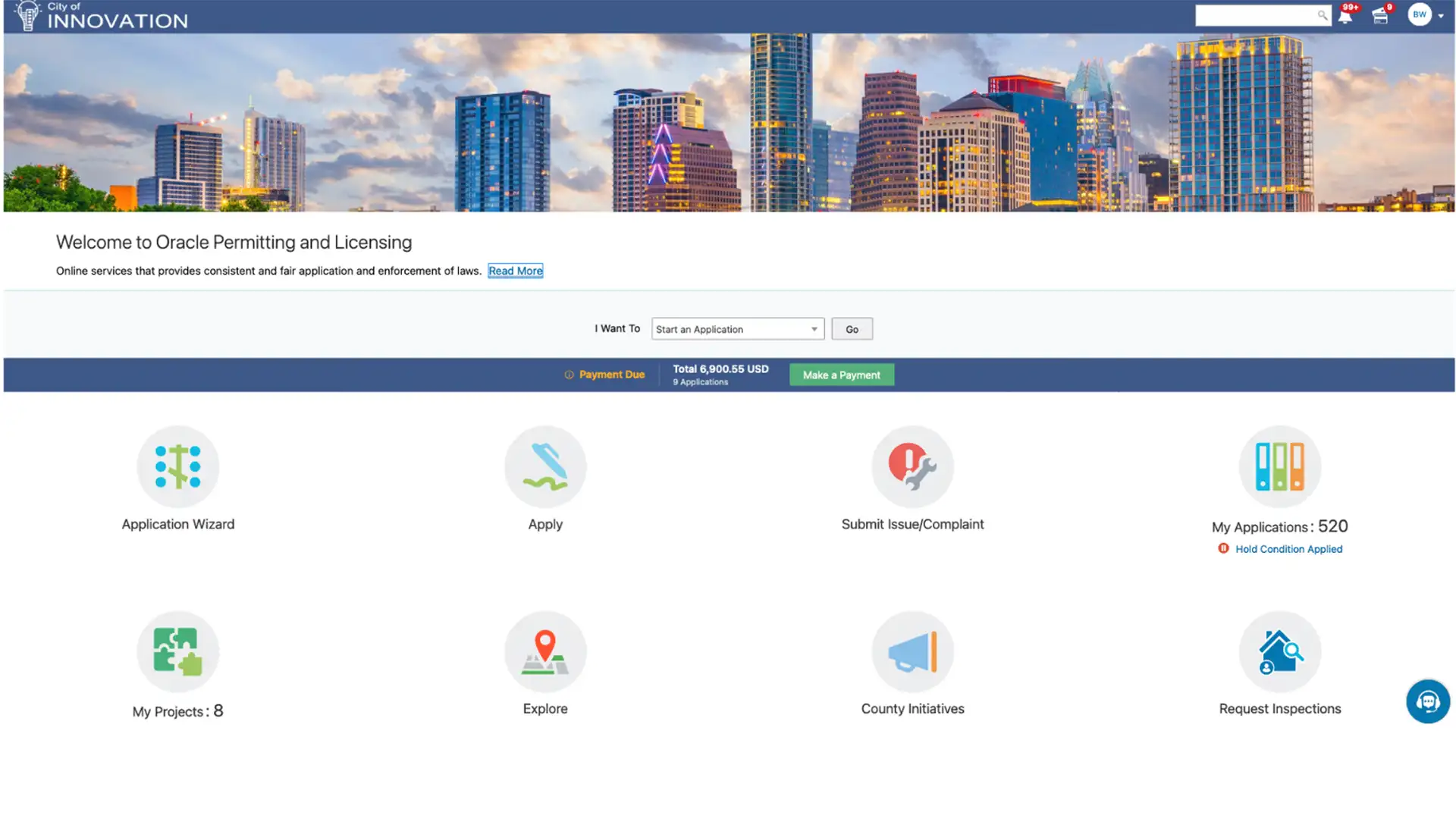
Pros
- Strong government-grade security and compliance.
- Flexible cloud deployment across regions.
- Seamless integration with other Oracle products and third-party applications.
- Highly scalable, easily manages large datasets and heavy workloads of larger agencies.
Cons
- Complex implementation requires significant resources and skilled staff.
- High costs make it unsuitable for smaller agencies.
- Complex customization compared to modern government CRMs.
- Requires substantial training, governance, and change management to fully realize value.
Pricing
Pricing for Oracle’s government solutions is available upon request.
Most Important Features to Look for in Government CRM Software
Selecting the right CRM for government use requires more than standard functionality. Below are the most important CRM features to consider when evaluating a CRM platform for the government sector:
- Citizen relationship management - centralizes constituent data and interaction history across all channels, providing agencies with a 360° view of each citizen.
- Service management - enables public agencies to efficiently manage citizen requests, track cases, and monitor service delivery from initiation to resolution.
- Workflow automation - streamlines repetitive administrative processes, such as permit approvals, benefits processing, or complaint resolution, reducing manual workload and turnaround times.
- Self-service online portals - enable citizens to manage their own service requests, submit applications, track case statuses, and leave feedback without visiting or calling the government offices.
- Regulatory compliance control - given the sensitivity of government data, CRM must ensure full adherence to data privacy and governance standards such as GDPR, HIPAA, or FedRAMP. Standard security features include role-based access control, data encryption, audit trails, multi-factor authentication, and automatic documentation of compliance procedures to protect citizen data.
- Artificial Intelligence (AI) - AI agents help government employees automate routine tasks, find relevant data, and make faster, more informed decisions. They can provide smart recommendations, summarize case histories, and assist with service requests. AI agents can also streamline customer service by answering frequently asked questions, providing timely updates, and guiding citizens through processes in real-time.
Summary
A modern CRM system helps government agencies improve service delivery, streamline operations, and build stronger relationships with citizens. With features like citizen data management, case tracking, and secure workflow automation, agencies can respond more efficiently to public needs while staying compliant with regulations.
Selecting the right CRM starts with understanding your specific needs. Look for solutions that offer secure data management, flexible process automation, and tools for citizen engagement. Evaluate vendors based on scalability, compliance capabilities, ease of use, and integration with existing systems.
Investing in the right technology today lays the groundwork for a more efficient and citizen-centric government tomorrow. Try Creatio for free and find out how it can empower government agencies to transform public services.






















































